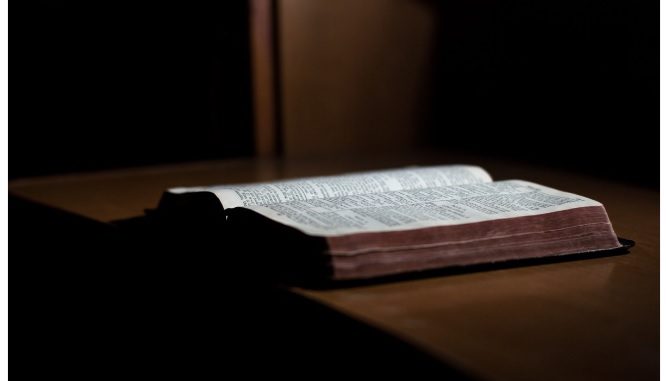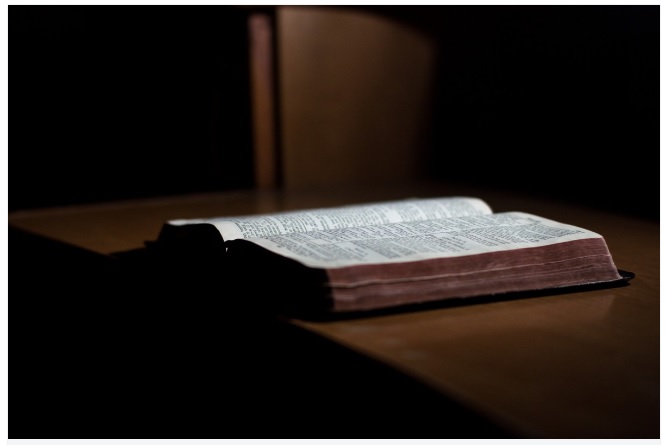

Don’t let Leftist social media shut us out! Sign up for Daily Surge’s daily email blast… it’ll keep you updated on each day’s Daily Surge new columns. Go to dailysurge.com and sign up under “Free Newsletter” on the right side of the page, one-third of the way down. It’s easy! And like it says, it’s free!
Surge Summary: When the Bible was eased out of America’s education system, societal problems began multiplying. America’s founders and early leaders predicted as much. No Bible means no foundation for the nation’s morality.
by David Lane
On December 22, 1620, the Puritans, one hundred and one in number, disembarked and set foot on land at Plymouth Rock. Thus began a new era in the history of the world. Their first act after leaving the Mayflower was to kneel, pray, and offer thanksgiving to God in the name and for the sake of Christ, taking possession of the continent.1
Sixty-two years later, William Penn [1644-1718], founder of the Province of Pennsylvania, the British North American colony that became the U.S. state of Pennsylvania, stated the obvious: “Let men be good, and the government cannot be bad.” Early America harbored a healthy dose of skepticism towards the secular belief in the fundamental ‘goodness of man’.
Fast-forwarding 60 more years, we find George Whitefield [1714-1770] holding revival meetings that became known in American history as the First Great Awakening. Benjamin Franklin, Whitefield’s good friend, recorded the effects of the Gospel on Philadelphia and the fledgling nation: “It was wonderful to see the change soon made in the manners of our inhabitants; from being thoughtless or indifferent about religion, it seems as if all the world were growing religious; so that one could not walk thro’ the town in an evening without hearing psalms sung in different families on every street.” [philawalk.org/whitefield]
A few years prior, in 1726, William Tennent [1673-1746] founded Log College in what is now Warminster, Pennsylvania. Tennent, an early Scottish-American Presbyterian minister and educator in British North America, filled his pupils with evangelical zeal and all of his known graduates became revivalist preachers in the First Great Awakening.
George Whitefield described the physical structure of Log College as very plain, though highly innovative. That particular theological training college from the early 18th century was renamed in 1896 and became Princeton University.
A strange passiveness has crept over time over American Christendom as secularism has largely 1) wiped out the actuality of America’s Christian founding, 2) erased from institutional memory that 98% of the first 108 early American colleges were famously Christian, and 3) made the Herculean effort to blot out the Founders’ rendered judgment that virtue and liberty are inseparably linked.
In God’s unending order, freedom cannot long be preserved in the absence of virtue among the people and their representatives.2
In making an appraisal of contemporary education, we once again refer to the co-author of the First Amendment to the U.S. Constitution, American Founder Fisher Ames [1758-1808], who declared in 1789: “We have a dangerous trend beginning to take place in our education. We’re starting to put more and more textbooks in our schools. We’ve become accustomed to putting little books into the hands of children, containing fables and moral lessons. We’re spending less time in the classroom on the Bible, which should be the principal text in our schools.”
How did contemporary America arrive at the place where the perversion of truth leads to calling good evil and good evil? A perversion that changed the Bible from being the principal textbook into something illegal, with depravity and baseness becoming promptly normalized and exalted in public education.
Modern Christendom is a mere shadow of its former self as represented by those who founded the nation “for the glory of God and advancement of the Christian faith.”
Manifesting little or nothing of Christ’s character, contemporary American Christendom appears to have lost the drive and motivation to emulate His works.
In his excellent work Why We Should Call Ourselves Christians: The Religious Roots of Free Societies, the Italian philosopher and politician Marcello Pera [born 1943] points out that the intellectual and political elite of the West consider religion and Christianity in particular a primitive form of knowledge, a consolation for the weak-minded, and an obstacle to peaceful coexistence in the community.
“We are told that politics must take a neutral stance on religious values,” Pera writes, “and that societies must hold together without any reference to religious bonds. Liberalism is considered to be ‘free-standing’ and the Western, liberal, open society is taken to be ‘self-sufficient.’”
Secularism holds the treacherous and unsound notion that the State can impart virtue in its citizenry. Such a notion in reality bears the hiss and guile of a brood of vipers. Directed by sound judgment and well aware of the dangers of unchecked power, America’s Founders were so wise to ensure the separation of power in the government through the establishment of a checks and balances system.
Dr. Peter J. Leithart argues that when Europeans discovered that theology can be very divisive, they concluded that the only way to restore comparative harmony was to expunge theology from the public square and drive theological determination and debate into the recesses of the conscience and safely behind the walls of the church building. Hence, the lacking in force and effectiveness of present-day American Christendom.
Stanley Mattson, Founder and President of the C.S. Lewis Foundation of Redlands, CA, wrote the Foreword to Indian philosopher Vishal Mangalwadi’s masterly study The Book that Made Your World: How the Bible Created the Soul of Western Civilization[2011].
Demolishing one of the key tenets of liberalism, Mattson wrote: “If there is no truth to be discovered – if all truth is merely a function of social constructs – then reason itself has no genuine authority, and in its place, academic fashion and marketing determine what a culture believes. More foreboding still, the risk is real that outright coercion may replace the authority that the modern world once ascribed to Truth. Questions concerning the nature of reality, the meaning of life, of honor, of virtue, of wisdom, and of love are understood to be nothing more than curious relics of old-fashioned thinking.”
The American Founders deemed Scripture to be culture’s lifeline. The sacred book provided them with wisdom’s communicable attributes, which enable one to sway nations3 and “kings to reign and rulers to decree justice.”4
They warned that the light of America would grow dim and that culture would collapse if the Word was removed from the education of America’s youth.
Yet, with Gideons and Rahabs beginning to stand, there is reason for optimism. Men and women of Issachar are coming to a public square near you, in anticipation of 1 Kings 18:44: “Behold, a little cloud like a man’s hand is rising from the sea.”
David Lane
American Renewal Project
- Benjamin F. Morris, The Christian Life and Character of the Civil Institutions of the United States [1864].
- Archie P. Jones, Foreward to The Christian Life and Character of the Civil Institutions of the United States [1864].
- Bruce K. Waltke, Proverbs Commentary.
- Proverbs 8:15.
The views here are those of the author and not necessarily Daily Surge.
Originally posted here.
Image: CC0 Public Domain; https://pxhere.com/en/photo/959354
The post Duhhhh! America’s Principal Textbook Is Banned … Society-Wide Problems Follow appeared first on DailySurge.